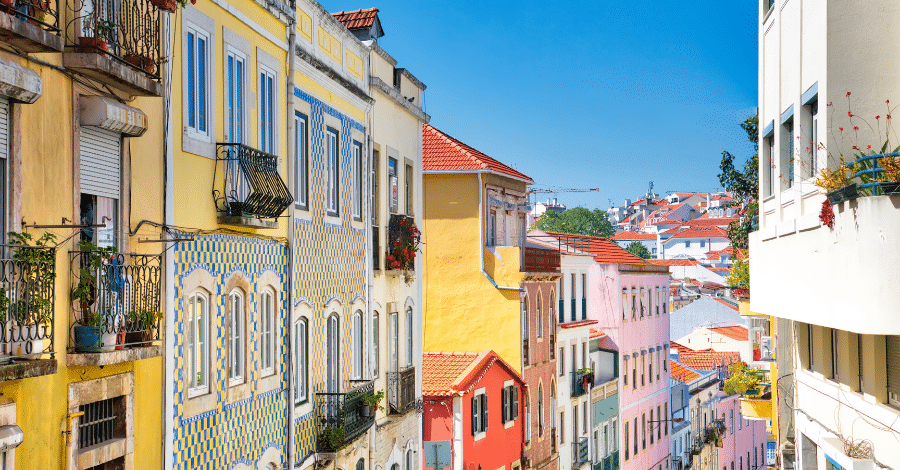Lisbon is the lively and cosmopolitan capital city of Portugal. With its historic beauty, vibrant culture, and coastal charm, Lisbon attracts expats from all over the world who are planning to start a new chapter of their lives in Portugal. If owning an apartment Lisbon seems like a distant dream, there is good news; finding an apartment for rent in the capital city is a popular and practical choice.
Renting an apartment in Lisbon is the ideal option if you’re on a temporary work assignment or just starting your new life in Portugal. It allows you to experience living in Lisbon without a long-term commitment, giving you time to decide if it’s the right place for you.

Here’s what you need to know in order to find an apartment for rent in Lisbon:
The challenges of renting an apartment in Lisbon
Renting an apartment in Lisbon presents its fair share of challenges. One of the major hurdles is the high demand for housing in the city, resulting in a limited supply of available apartments. This scarcity often leads to fierce competition, making it difficult to secure a desirable place.
Moreover, navigating the rental market can be complex, especially for foreigners moving to Portugal or those unfamiliar with local regulations and processes. Dealing with language barriers, understanding lease agreements, and ensuring fair treatment from landlords can add another layer of difficulty.
Some landlords may also request extensive paperwork or large deposits, further complicating the rental process. Despite these challenges, with proper research, persistence and understanding of the local market, finding a suitable apartment in Lisbon is achievable.

What is the first step to finding an apartment for rent in Lisbon?
The first step to finding a suitable rental in Lisbon is doing thorough research. As a prospective tenant, it is important to familiarize yourself with the city’s rental market, including current rental prices, popular neighborhoods and the types of apartments available. With 24 freguesias (formal administrative districts) in Lisbon, it can be tricky to find the right neighborhood to call home.
Start by exploring online platforms and real estate websites that list rental properties in Lisbon. These platforms provide valuable information on available apartments, their features and rental prices. It’s also important to set a realistic budget based on your financial situation and desired location.

Additionally, consider the amenities and facilities you prioritize in an apartment, such as proximity to public transportation, grocery stores, or healthcare. This will help narrow down your search and identify suitable neighborhoods. Reading reviews and seeking recommendations from locals or expatriate communities can also provide insights into the quality and reputation of different areas.
The different types of rental apartments in Lisbon
Lisbon offers a variety of rental apartments to cater to different preferences and budgets. One common type is the traditional apartment found in historic buildings, known for their charming architecture and unique character. These apartments often feature high ceilings, decorative tiles and balconies or terraces.

On the other hand, there are modern and newly constructed apartments that boast contemporary designs, sleek finishes and amenities such as gyms or swimming pools. These modern apartments are typically found in newly developed areas of the city.

Additionally, there are also furnished apartments in Lisbon Portugal, which come fully equipped with furniture and appliances, providing convenience for those looking for a hassle-free move.
Another option is shared apartments or co-living spaces, where individuals or groups can rent a room within a larger apartment, sharing common areas such as the kitchen and living room. These types of apartments are popular among students or young professionals looking for affordable accommodation and a sense of community.
What paperwork do you need to rent an apartment in Lisbon?
When renting an apartment in Lisbon, there are several important documents and paperwork you will typically need to provide. These documents are necessary for landlords or real estate agencies to assess your eligibility as a tenant and ensure a smooth rental process. Here is a detailed list of the paperwork required:
1. Identification Documents:
-
- Passport or ID card: A valid form of identification is essential to establish your identity as a tenant.
2. Proof of Income and Financial Stability:
-
- Pay slips or employment contract: These documents demonstrate your regular source of income and employment stability.
- Bank statements: Providing recent bank statements can give landlords or agencies an overview of your financial situation.
3. Portuguese Fiscal Number (NIF):
-
- This is a unique identification number issued by the Portuguese tax authorities. Obtaining a NIF is required for legal and tax purposes in Portugal, including renting a property.

4. Reference Letters:
-
- Previous landlord references: Letters from previous landlords or rental agencies can vouch for your reliability and adherence to rental agreements.
- Employer reference letter: This letter confirms your employment status and can help establish your financial stability.
5. Rental Guarantor or Co-Signer:
-
- In some cases, landlords may request a rental guarantor or co-signer who agrees to take responsibility for the rent if you default on payments.
6. Rental Application Form:
-
- This is a standard form provided by the landlord or agency that collects basic personal information, contact details and preferences.
7. Deposit and Rental Agreement:
-
- Upon agreeing to rent the apartment, you will need to pay a security deposit, typically equivalent to one or two months’ rent. A rental agreement, outlining the terms and conditions of the lease, will also be provided and signed by both parties.
How much does it cost to rent an apartment in Lisbon?
Renting an apartment in Lisbon comes with different price tags based on factors such as location, size, condition and amenities. Despite the recent upward trend in rental prices, Lisbon remains relatively affordable compared to other major European cities.
The average rent price per square meter in the city is $22 (€20) according to Idealista.pt. This means that renting a 75-square-meter apartment (approximately 800 sqft) in Lisbon will cost you on average $1,650 or €1,500 per month. Similarly, a more spacious 100-sqm Lisbon apartment will be upwards of $2,000 per month.
Monthly rent for a studio or one-bedroom apartment typically falls between $660 (€600) and $990 (€900), while a two-bedroom apartment ranges from $990 (€900) to $1,650 (€1,500). Larger apartments with three or more bedrooms can cost anywhere from $1,650 (€1,500) to $3,300 (€3,000) per month, depending on various factors like the location and the size and quality of the apartment.

When renting in Lisbon, tenants are usually required to provide a security deposit, which typically amounts to one or two months’ rent. This deposit is refundable at the end of the tenancy, minus any deductions for damages or outstanding bills. In addition to rent, tenants are responsible for paying utilities such as electricity, water and gas.
The cost of utilities can vary depending on the size of the apartment, consumption habits, and the property’s energy efficiency. On average, renters in Lisbon can expect to pay around $100 to $200 (€90 to €180) per month for utilities.
Apart from utilities, renters should also consider the cost of internet and TV services. These additional expenses can range from $50 to $70 (€45 to €65) per month, depending on the chosen provider and package.
Furthermore, if you rent an apartment in a building with shared amenities or common areas, you may be required to pay monthly condominium fees. These fees contribute to the maintenance and management of the building and typically range from $60 to $180 (€55 to €165) per month.
Depending on the area you choose to call home, here are the average rent prices you can expect to find in Lisbon by neighborhood:
How to find an apartment to rent in Lisbon
Finding an apartment to rent in Lisbon can be an exciting yet challenging endeavor. Here are three different ways you can explore to find the perfect rental in the vibrant capital of Portugal.

- Online Rental Platforms: One of the most popular methods is to utilize online rental platforms like Idealista, HousingAnywhere or OLX. These platforms provide extensive listings with various search filters, allowing you to customize your preferences based on location, budget, amenities and more. You can browse through detailed descriptions, view pictures, and even contact landlords or property managers directly through the platform. Online platforms also provide user reviews and ratings, helping you make informed decisions.
- Local Real Estate Agencies: Engaging with local real estate agencies is another effective approach. These agencies have in-depth knowledge of the rental market and can offer personalized assistance. By visiting their offices or contacting them directly, you can discuss your requirements and budget with a real estate agent who can guide you through available options, schedule property visits, and negotiate rental terms on your behalf. ERA, Remax and Century21 are the three most popular agencies in Portugal.
- Networking and Word of Mouth: Networking within the local community can yield excellent results when searching for an apartment in Lisbon. Connect with friends, colleagues or acquaintances residing in the city and inform them about your rental needs. They may be aware of upcoming vacancies or be able to refer you to potential landlords or property owners.
Renting an unfurnished apartment in Lisbon
Renting an unfurnished apartment in Portugal offers a blank canvas for you to create a personalized living space. While it requires more effort to furnish and decorate, it allows you the freedom to bring your own style and preferences to their new home.
Unfurnished apartments in Lisbon Portugal typically include essential fixtures such as kitchen appliances and bathroom fittings but lack furnishings like beds, sofas or dining tables. This provides tenants with the opportunity to make the space truly their own.
Renting an unfurnished apartment also often comes with longer lease agreements, making it an attractive option for those seeking stability and a place to call their own.
What does a Lisbon apartment lease entail?
When renting in Lisbon, the lease typically involves several important aspects that govern the rental agreement between the landlord and the tenant. Here are some key elements commonly found in a Lisbon apartment lease:
- Duration: The lease specifies the duration of the rental agreement, indicating the start and end dates. It may be a fixed-term lease, typically for one year, or a periodic lease, which renews automatically on a monthly basis.
- Rent and Payment Terms: The lease outlines the monthly rent amount and the currency in which it should be paid. It also includes details on payment methods, due dates, and any late payment penalties. Additionally, it may mention whether utilities (water, electricity, etc.) are included in the rent or paid separately by the tenant.
- Deposit: The lease agreement stipulates the amount of the security deposit required by the landlord. In Portugal, it is common for the deposit to be equivalent to one or two months' rent. The conditions for refunding the deposit, such as deductions for damages or outstanding rent, are also typically outlined.
- Maintenance and Repairs: The lease may specify the responsibilities of the landlord and the tenant regarding property maintenance and repairs. It often indicates that the tenant is responsible for day-to-day maintenance, while major repairs and structural issues are the landlord's responsibility.
- Termination: It also outlines the conditions and notice period required for terminating the lease by either party. It may state that early termination by the tenant could result in penalties or the loss of the security deposit.
It's essential for both landlords and tenants to carefully read and understand the terms of the lease agreement before signing. If there are any doubts or concerns, it is advisable to seek legal advice or clarification from a professional.

